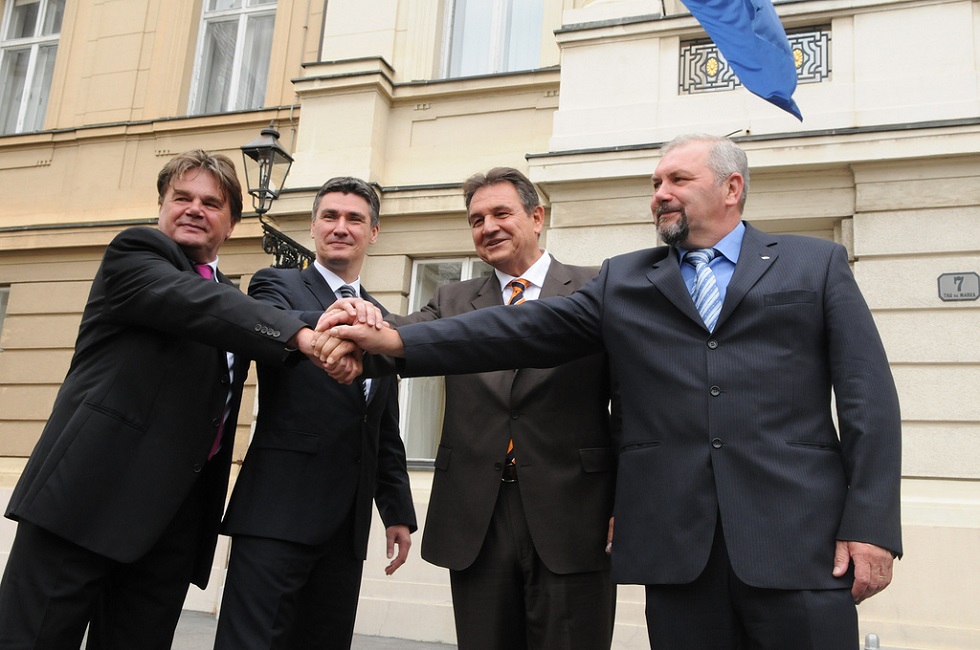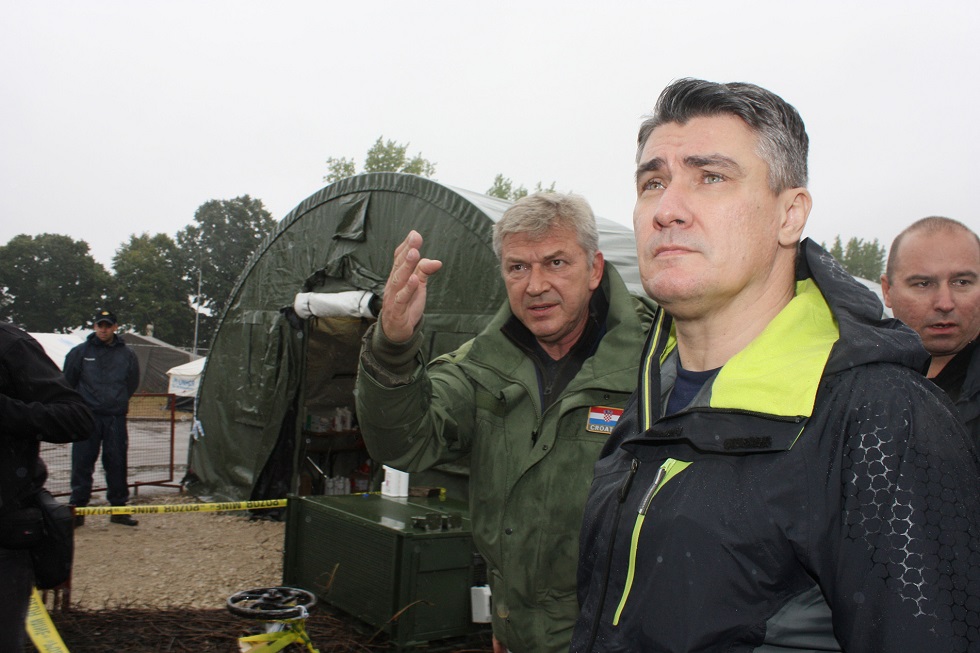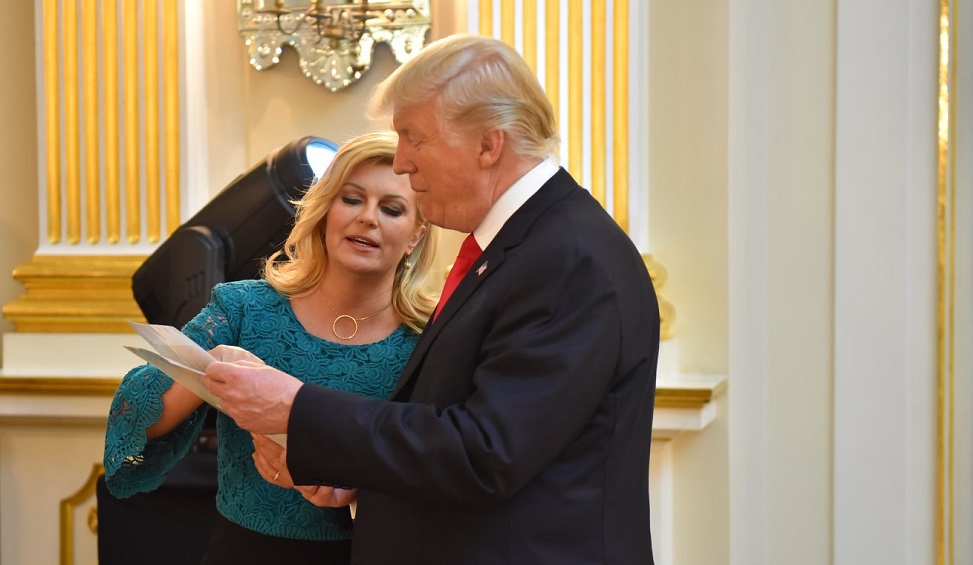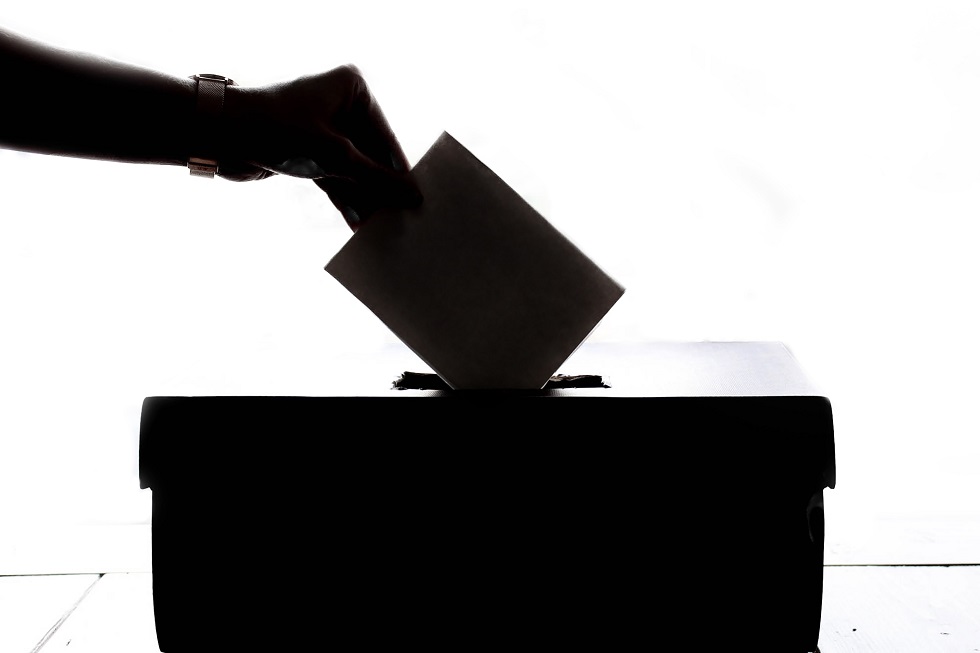Jandrokovic: SDP Has No Match for Plenkovic
ZAGREB, May 20, 2020 - Croatian Democratic Union (HDZ) secretary-general Gordan Jandrokovic said on Tuesday that a grand coalition with the Social Democratic Party (SDP) "is not an option that interests us" and that the SDP did not have a man who was a match for HDZ leader and Prime Minister Andrej Plenkovic.
"We believe we will achieve a relative victory and find partners to form the government and avoid connecting with the SDP," the speaker of the parliament which dissolved on Monday said about the upcoming election.
Speaking on the public broadcaster, Jandrokovic said he expected President Zoran Milanovic to be the president of all citizens. Commenting on Milanovic's role in the election campaign, he said, "In a certain way, he is choosing a side and discretely trying to help the SDP."
Speaking of SDP leader Davor Bernardic, Jandrokovic said: "he is not up to the task of (being prime minister) either as a man or as a politician."
Asked about a national salvation government in cases of a second COVID-19 wave, he said that for now, he did not see the need for that. "Who would be our partners in this grand coalition? Those of yesterday or today, who have shown how irresponsibly they approach serious matters?"
Jandrokovic said the opposition, which demanded a parliamentary election in recent months, was now scared because Plenkovic and the HDZ had done an excellent job in dealing with the corona crisis and that this was why it had begun to defame the members of the crisis management team "in an ugly and inappropriate manner."
Croatian Zoran Milanović First Former Prime Minister Elected President
Although only 53 years old, Croatian President-elect Zoran Milanović is already a political veteran. Since Croatia's independence, he is the only politician to be elected to two of the most important state functions, first as prime minister and now president.
He was born on October 30, 1966 in Zagreb. In private conversations, he likes to point out that Zagreb shaped his identity, but was also intrigued by his family history, according to Robert Bajruš/Jutarnji List on January 6, 2020. Therefore, Milanović researched archives from Austrian barracks and the Sinj monastery in a quest for information on his ancestors and their life paths. Zoran Milanović's family is from western Bosnia and arrived in the Sinj region as part of a mass migration led by Franciscan Friars in 1687. His mother Đurđica Matasić's family has lived in Sinj for almost two centuries.
Father Held Key Zagreb Government Positions
His father, Stipe Milanović, performed several important roles during the socialist regime: he was Cabinet Secretary to Miko Tripalo, a Zagreb city council member and chaired the Vatroslav Lisinski Hall Construction Committee. In the early 1990s, he joined HDZ (Croatian Democratic Union) and became Assistant Minister to Vlatko Pavletić.
Milanović's claim that his grandfather was an Ustasha member (Croatian WWII Fascists) was one of the more interesting developments in the 2016 election campaign. He was referring to his mother Đurđica’s stepfather, Petar Plišić, but had kept silent about him until then.
He graduated from the Faculty of Law in Zagreb in the early 1990s where he was an excellent student. He received the Rector's Award and participated in the "Telders" competition in public international law at The Hague.
Began Post Law School Career in Foreign Diplomacy
Milanović landed his first job at the Commercial Court in Zagreb and then the Ministry of Foreign Affairs in 1993, where he arrived upon the recommendation of Ivan Šimonović, professor at the Faculty of Law and Permanent Representative of the Republic of Croatia to the UN. He became advisor to the Croatian Mission to the European Union and NATO in Brussels in 1996 and completed a postgraduate certificate in European Union law there two years later.
He joined SDP (Social Democratic Party of Croatia) immediately after his return to Zagreb in 1999. After SDP won the January 3, 2000 elections as part of a coalition, he was entrusted with a position in communications with NATO. Three years later, he was appointed Assistant Minister of Foreign Affairs under Tonino Picula. However, he left diplomacy and was brought onto the SDP Executive Board at the invitation of Ivica Račan after the HDZ won the 2003 elections.
Assumed SDP Leadership Role After Račan
The SDP party membership overwhelmingly chose Milanović as their new leader when Ivica Račan died in 2007. He had defeated Željko Antunović, Milan Bandić and Tonino Picula; the party’s old guard. While Račan had not considered him his successor; within a month Milanović had taken control of SDP and set about overthrowing Ivo Sanader.
Diana Pleština, widow of the former SDP leader, spoke about the Račan-Milanović relationship. While she has always thought well of Milanović; she also noted:
"Ivica Račan understood that Milanović was young and well-educated, and had experience communicating with the outside world, but he was not referring to Zoran Milanović in the phrase 'New SDP Force'. Instead he was referring to Milanović along with other members of the party. Therefore, the ‘New SDP force’ was not referring to one person, but an overall proposal to continue the rejuvenation of the Social Democratic Party, and one of those players was Milanović,” Dijana Pleština recalled.
However, he lost to Ivo Sanader in the 2007 parliamentary elections and spent the next four years leading the opposition. During that time, he was able to marginalize the old guard within SDP and surround himself with a new generation of associates including Ranko Ostojić, Siniša Hajdaš Dončić, Rajko Ostojić, Ante Kotromanović, Igor Dragovan and Gordan Maras.

Defeated Scandal Ridden HDZ With Kukuriku Coalition
In November 2011, under Milanović’s leadership, the SDP-HNS-IDS-HSU coalition overwhelmingly defeated HDZ, which had been rocked by a series of corruption scandals. Their coalition ruled Croatia for the next four years. Before that victory, Milanović played a crucial role in the election of SDP presidential candidate Ivo Josipović. Josipović's victory had a strategic effect on the downfall of HDZ and Prime Minister Jadranka Kosor, and subsequent victory of the four-party coalition.
Milanović's political experience did not often reveal itself during his first three years in office. In the face of poor economic performance, he was subject to widespread criticism for refusing to make severe cuts to a bloated and inefficient state administration, which was stifling the economy. In addition, almost nobody believed he could make a comeback after he barely succeeded in expelling Slavko Linić from SDP in June 2014. Those doubts were strengthened after Kolinda Grabar-Kitarović narrowly defeated Ivo Josipović in the 2015 presidential election.
"Who would have thought that we were capable of regaining voter confidence back in January," Milanović recently suggested in a private interview.
Political Personal Evolution and Move to Right
Nevertheless, he changed tremendously and became much more accessible while choosing to remain silent about the confrontation with Linić. Even then, a well-known SDP politician revealed that he had been closely observing Milanović's career for seven years, and denied the widespread belief that the SDP chief was incapable of transforming himself:
"After losing the election to Ivo Sanader in 2007, Milanović realized that he had to change. He succeeded because he strengthened the party with new young talent. I’ve also changed and have begun displaying a better part of my character in interactions with people. That’s why I believe he can also change in a positive way,” claimed this member of government.

Praise for Franjo Tuđman and Croatian Nation in Knin
After all, Milanović's metamorphosis, which manifested itself in a slight turn to the right, was first noticed in Knin on August 5, 2014 when he gave a speech commemorating Dan domovinske zahvalnosti (Homeland Thanksgiving Day), which suggested a more patriotic direction. It was then that he first came forward with the conviction that his government was a people's government elected by the Croatian nation, comprised of people who are of primarily Croatian background. "As long is that is the case, we will oversee this country and lead it on the right path with Croatian interests in mind," Milanović said.
Milanović also paid respect to the first Croatian president, Franjo Tuđman, "because he was the Croatian president during a most difficult and challenging time."
“We have been waiting for a thousand years to have our own state and are grateful to those who gave everything for our country. For thousands of years we have worked, fought and died for foreigners, who treated us like foreigners, but they are not our enemies today. We are united with them in the EU and are building a better future together,” said Milanović in Knin.
It was the beginning of a 16-month campaign in which Zoran Milanović decided to tackle the stigma of (Croatian) leftists and present himself as a self-aware national leader. A social democrat who respects Tuđman, frequently mentions Croatia and condemns chauvinism then became his election-winning formula.
He also hired PR expert Alex Braun and his government achieved positive economic results in 2015. However, Milanović narrowly lost the parliamentary elections, remained at the helm of the SDP and defeated his old rival, Zlatko Komadin, in party elections.
Withdrawal from Politics After 2016 Defeat
After the fall of Prime Minister Tim Orešković’s short-lived administration in late 2016, Milanović led the People's Coalition into the elections, but lost, and then announced that he was withdrawing from politics.
In November 2016, he founded EuroAlba Advisory. Earlier this year, the media reported that the company's total 2018 revenue was 744,970 HRK (99,700 EUR), about a 20 percent increase from a 2017 reported revenue of 625,000 HRK (83,600 EUR).
Milanović lost his father Stipe and his younger brother Krešimir, who died after a short illness, during his election campaign late last year.
Follow our Politics page to stay updated on the new Croatian presidency and upcoming 2020 parliamentary elections.
Croatia Presidential Election: Milanović Defeats Incumbent Grabar-Kitarović
According to final election results, released at 5:30am CET (Central European Time) on January 6, 2020; former Prime Minister Zoran Milanović has defeated incumbent Croatian President Kolinda Grabar-Kitarović and won his first five-year term as President of Croatia.
Here is a breakdown of the final election results with 100% votes processed (updated 5:30am CET):
52.67% - Zoran Milanović – Former Prime Minister | SDP
47.33% - Kolinda Grabar-Kitarović – Incumbent President | HDZ
Former Croatia Prime Minister Began Career as Diplomat
Zoran Milanović, born in 1966; was Prime Minister of Croatia from 2011 to 2016. He was also the leader of SDP (Social Democratic Party of Croatia), the largest center-left political party, from 2007 to 2016. He served as leader of the opposition twice, from 2007 to 2011 and for several months in 2016.
Milanović began his career in the Croatian Ministry of Foreign Affairs. He served as advisor at the Croatian Mission to the European Union and NATO and was assistant to the Foreign Minister of Croatia for political multilateral affairs.
Oversaw Croatia Entry Into EU in 2013
In June 2007, Milanović was elected President of SDP and formed a coalition uniting four center-left political parties, which won an absolute majority in the 2011 parliamentary election. He became Prime Minister later that year and oversaw Croatia’s entry into the EU in 2013.
His cabinet introduced changes to the tax code and began several large infrastructure projects. Milanović also supported the expansion of the rights of same-sex couples and introduced the Life Partnership Act.
Post-Political Career as International Consultant
He served as Prime Minister until 2015 and led the four-party coalition until early parliamentary elections in 2016. Milanović announced his withdrawal from politics following a surprise defeat. He began a career as a consultant and worked as advisor to Albanian Prime Minister Edi Rama.
In June 2019, Milanović announced his campaign for President of Croatia under the slogan “A President with Character.” He ran on a center-left platform, his record as prime minister and promised to be tough on corruption.

Kolinda Grabar-Kitarović and Donald Trump | Facebook
First Woman and Youngest Croatian President
Kolinda Grabar-Kitarović, born in 1968; has been the President of Croatia since 2015. She was the first woman and the youngest person to ever assume the office. In 2017, Forbes magazine listed Grabar-Kitarović as the world's 39th most powerful woman.
Before her election, Grabar-Kitarović held several governmental and diplomatic positions including Minister of European Affairs, Minister of Foreign Affairs and European Integration, Croatian ambassador to the United States, and NATO Assistant Secretary General for Public Diplomacy.
She was the only female candidate in the Croatian presidential elections held in December 2014 and January 2015 and was runner-up in the first round. She narrowly defeated incumbent President Ivo Josipović in the second round.
International Press Attention at 2018 World Cup
In 2018, Grabar-Kitarović received international press attention for attending the FIFA World Cup quarter-final and final matches, where she wore colors of the Croatian flag in support of the national team, who finished the tournament in second place.
Gaffes and Controversial Endorsements
Her presidential re-election campaign has weathered a series of gaffes and missteps. Last month, she claimed at a campaign rally in Osijek that she had secured jobs for Croatian citizens to work from home for 8000 EUR, after they had received training abroad. However, she later declined to provide details.
While she has positioned herself as a centrist, she welcomed endorsements from several controversial and far right-wing political figures. Marko Perković Thompson, a singer known for his use of WWII Croatian fascist symbols and language in performances, backed her re-election. And Grabar-Kitarović’s website featured a video message from Julienne Bušić, American-born author and activist, who hijacked a TWA flight in 1976 to promote Croatian independence. The party of Zagreb Mayor Milan Bandić, who is facing corruption charges, also endorsed her candidacy.
Former Prime Minister Maintained Solid Lead in First Round
According to exit polls in the first round of elections, held on December 22, 2019; Zoran Milanović maintained comfortable leads over Grabar-Kitarović and Miroslav Škoro, his two main opponents. Grabar-Kitarović was initially polling within one percentage point of Miroslav Škoro, which led to doubts about whether she would advance to the second round. According to final election results, Milanović received 29.55% of the vote and finished ahead of Grabar-Kitarović (26.65%) by nearly three percentage points. In turn, she eliminated Škoro (24.45%) from the run-off by a lead of just over two percentage points.
Grabar-Kitarović and Škoro, a popular folk musician, competed for support from center-right and far-right political parties and organizations, which led some analysts to believe that Škoro supporters would automatically shift their allegiance to the president in the run-off. However, pre-election polls had generated inconclusive results; with the President and former Prime Minister polling within a margin of error and leaving behind a large block of undecided voters. While Škoro confirmed that he would vote at the polls; he declined to endorse either candidate – and said that he would void his ballot.
Both candidates agreed to three debates, which were held on Monday, Thursday and Friday preceding the election. Mutual accusations of incompetence, impropriety and dishonesty dominated the discussions, which offered little on specific policy proposals.
Follow our Politics page for updates on this presidential election and upcoming 2020 parliament elections.
Croatia Presidential Election Silence: Live Updates Sunday as Polls Close
As of 12:00am Saturday January 4, 2020; the two-day electoral silence is in effect for Croatia. It will end at 7:00pm CET on Sunday, after polling stations close, and TCN will be providing live election updates.
Approximately 3,860,000 second-round voters will decide whether current Croatian President Kolinda Grabar-Kitarović (HDZ) or former Prime Minister President Zoran Milanović (SDP) will head the country for the next five years.
Widespread Electoral Silence Imposed by Croatia SEC
The so-called electoral silence is imposed by the SEC (State Electoral Commission) before any election campaign in Croatia, according to Index on January 3, 2020. On Saturday, the day before an election, and Sunday, election day; the publication of estimates, results and previous unofficial election results are prohibited. This ban also applies to photos, statements and interviews from the two presidential candidates.
The State Election Commission (SEC) urged candidates, their nominees, voters, the media and media publishers to respect the silence.
No Penalties for Violating Electoral Silence
"I urge participants and voters to respect the principles of the electoral silence. I also ask that candidates discontinue promoting themselves or their programs," cautioned SEC Vice President Vesna Fabijančić-Križanić.
“Whether or not the electoral silence is a desirable practice is debatable, but this is the law and it must be respected. We urge everyone abide by the law, even though there aren’t any penalties imposed for violating it," the SEC vice president emphasized.
The SEC reminds the campaigns not to post new posters or leaflets for the two candidates, call citizens, or send them SMS messages or e-mails asking them to vote in this second round of presidential elections.
Social Network and Media Included in Electoral Silence
Social networks are included in the electoral silence as well. Therefore, media and media publishers are expected to remove everything from their program content which represents electoral advertising: including official advertisements, links, image links-ads (banners) which lead to candidates' campaign websites.
At midnight, the deadline for Grabar-Kitarović and Milanović to collect donations also expired. According to reports, the HDZ candidate, received 2.3 million HRK (308,700 EUR) from donors as of December 27, 2019 while the SDP candidate collected 813,000 HRK (109,000 EUR).

Element5 Digital | Unsplash
Polling Stations Will Open in 47 Countries
Elections for the Croatian president continued to a second round or runoff, because none of the 11 candidates received the required majority in the first election, which was held on Sunday December 22, 2019. The candidate who receives the highest number of votes in this round will win the election.
In addition to Croatia, presidential elections will be held in 47 other countries, with the first polling stations opening in Australia as early as Saturday night, Croatian time (CET).
Live Election Updates on TCN Starting 7:00pm CET
Follow our Politics page for live updates for the upcoming presidential election in Croatia, which takes place tomorrow Sunday January 5, 2020. We will be providing by-the-minute exit poll results and final election results after the polls close at 7:00pm Central European Time (CET).
SDP Members Launch Petition for Davor Bernardić to Step Down
Hot water for Bernardić, and just who thought up and prepared the petition remains unknown.
SDP Leader Davor Bernardić Visits Dubrovnik, Split and Šibenik
''We're a party of progressive people who believe in a better Croatia'' stated the young SDP leader.
SDP Secretary-General Runs into Motorcyclist with Car
Not your every day occurence...
SDP to Change Its Name?
According to some, current name is too reminiscent of Communist times.
Zoran Milanović Wins Big at SDP Party Convention
Almost all new members of the main party bodies are people supporting the current SDP president.
Battle for SDP Continues
Milanović has been re-elected as party president, but the fight for other positions in the party leadership is far from over.


